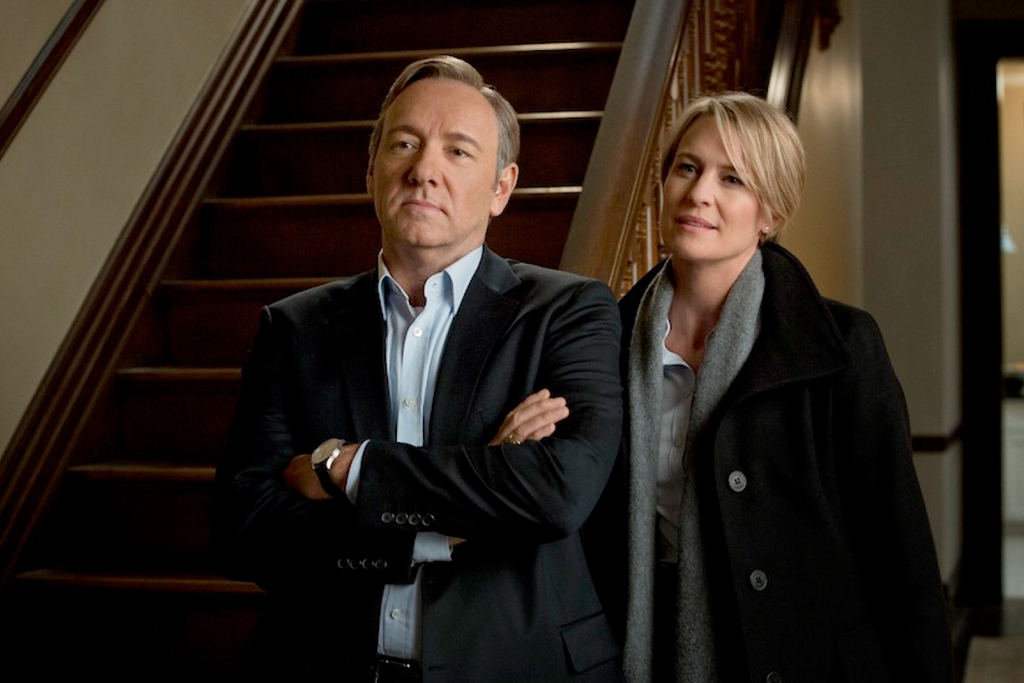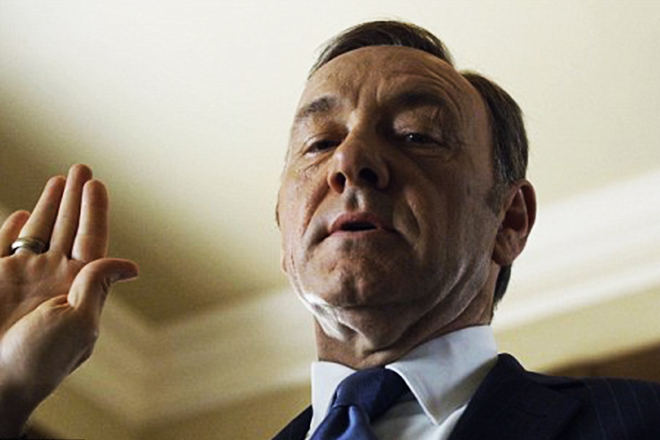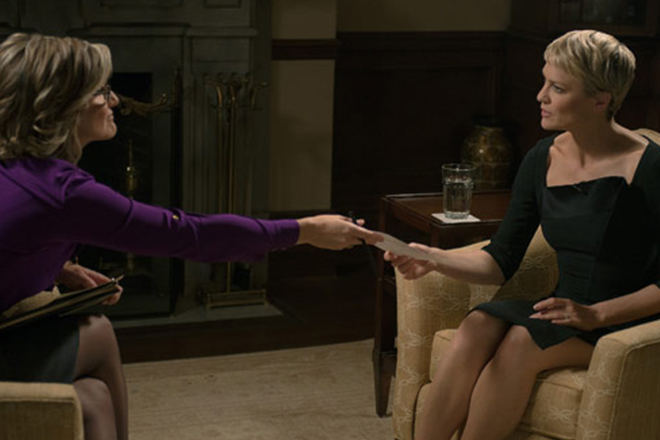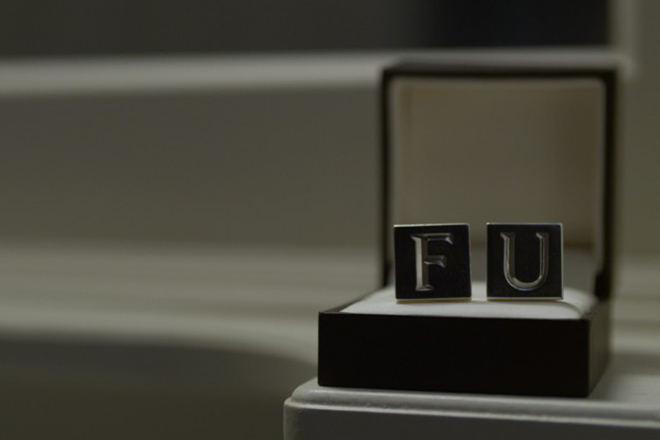Mid-Season Catch-Up: House Of Cards, Episodes 1-6
The first of two recaps we'll be publishing. If you haven't seen up to episode six, don't click this. There are spoilers.

HUGE SPOILER WARNING: If you’re not up to episode six of season two, get the hell away.
–
House of Cards is back, and just as twistingly cynical as ever.
Season two is once again packed to the constitutional rafters with political foofaraw, quadruple crosses over majority senate house floor votes, and a lot of other nonsense. In reality, this stuff allows America to function — but on this show it mainly just fills in the gaps between shocking deaths, snide asides and surreal excursions into what might be considered art.
Has there ever been a show that encourages such exaltation over its production, its watchability, and its performances, but where the finer plot details might count for absolutely nothing?
Here’s what has happened to our merry schemers in the first six episodes, and who’s winning which of the many battles being fought.
–
Frank vs. Journalism
Who’s winning? Frank. By a pretty huge lead.
We left last season as Team Truth — wary Janine, lovestruck Lucas and cold void of ambition Zoe — were beginning to dig up extra clues into the case of probably-murdered Congressman Russo.
In episode one, Frank and Zoe agree to make a new start: a lie on Zoe’s behalf and a feint on Frank’s. They meet on a subway platform, where Frank, dressed like the cartoon version of Inspector Clouseau, requests Zoe delete their entire phone history (is there no cloud on this show?), and, after watching her do it in House of Cards’ delightful, hovering phone-o-vision, he gives Zoe Barnes a quick shove onto the tracks.
Huh. I really thought Zoe was in this for the long haul. Her old relationship with Underwood was weird and creepy and fascinating. Her burgeoning one with Lucas was fantastic – it was a brilliant spin on Tony Soprano or Don Draper, the lead emotionally removed and focused on work, his paramour puppy-eyed and doting — flipped not only by gender but also by size, with the diminutive Kate Mara holding all the power over the lanky Sebastian Arcelus.
Anyway, see you later Zoe.
I am me. Thank God….! #HouseOfCards pic.twitter.com/Er0S3zu0QX
— Kate Mara (@_KateMara) February 20, 2014
Lucas takes up the mantle of dogged journalist, though his passions are fired by grief — a much less interesting contrast to the Underwood’s power trips than Zoe’s similarly ambitious brio ever was. With Janine scared out of town and his old mentor telling him to drop the story, Lucas enters THE DEEP WEB — that final frontier of child porn and government hacking — and starts chatting to a Heironymous Bosch fan.
All this would seem stupid, except that I truly believe deep hackers probably do things like animate CGI cauldron-hatted sparrows from 18th century paintings to deliver their messages. A long-haired guinea pig named Cashews arrives on the scene and only adds to the insanity. Long story short, Lucas gets set up by the FBI (care of Underwood) and charged with digital treason. He goes straight to jail. He does not collect a Pulitzer. Goodbye, Lucas.
–
Frank vs. Politics
Who’s winning? Frank.
Now Vice President, Frank has more meetings with milquetoast President Walker, and uses them to his satisfy his own hunger for power. An extended metaphor of the civil war, played out by Frank’s ever expanding model kit (this guy and his hobbies!), sets the scene for a season where the White House is divided against itself.
One exception to those Oval meetings, and a welcome return to Frank’s early days of bullying old men in his office, takes place in episode three, where, uh, something happened where a vote had to take place? In very exciting, ridiculous television, Republicans were carried into senate chambers in chains and made to vote on retirement age and entitlements. Or something?
Where The West Wing would happily pause the action so that a couple of characters could do three laps of the building while expounding on the finer details of Senate reform, House of Cards seems much more interested in bashing us over the head with the emotional motivations of its characters and leaving us guessing on the details of plot.

“I swear, on the oath of this office, to always let you know whether I’m happy or angry after a conversation. Don’t sweat it, my pleasure.”
So while we skim and flit across the facts of politics, we’re dragged down by reminders that Frank is underhanded, holds a grudge, and gets a little bloodthirsty when the going gets tough. No scene illustrates this more than the one in which Frank and Donald Blythe (a congressman burnt by Underwood in the first season) are trapped in Frank’s office. It’s all because of a false anthrax scare, but it gives us an excuse to watch Frank edge and manoeuvre and attempt to Jenga away all of Donald’s defences, playing on any potential vulnerabilities in order to pass a bill.
What exactly does the bill do? Not sure. Frank appeals to Donald’s dignity, his ego, his political clout, his taste for scotch, and finally tries to bribe him with some research funds for Alzheimer’s, from which Donald’s wife is suffering. All of this is interesting, but it’s delievered once again in HoC’s house style of making the understandable obvious. I love Frank’s snips and snipes to camera, but we can probably work out his motivations on our own. Without some hint of real politics, this could be a hugely enthralling, well acted show about a malicious fro-yo store employee and his schemes to become Master of Toppings. I’d still watch that (and eagerly), but it’d be nice to see some more of the trickle down from the top of the pyramid: how the protagonists’ deal-making affects the average joe.
–
Frank vs. Tusk
Who’s winning? It’s a tie.
Frank’s big battle this year is shaping up to be one against Raymond Tusk, nuclear energy impresario and the private sector devil on President Walker’s shoulder. It’s a super smart move by the show. Frank initially has to work with Tusk, or at least take him on surreptitiously, behind the President’s back. It also gives us a villain outside of politics, working different avenues than those that Frank has access to. And all the talk of energy puts the central theme of the show, POWER, in big blinking neon letters right there in front of us.
There’s a lot of kerfuffle about China and trade deals, with a sexually adventurous criminal diplomat and a hard-ass Native American casino owner in the mix, alongside Frank’s one-time colleague Remy, who tends to see Frank’s moves coming from a district away. Again, it’s a little tricky deciding whether any of this matters.
The real delight is seeing Frank and Tusk, two alpha dogs high on their own ethical depravity, glower on opposite ends of telephone calls. It’s like the bitchy call scenes in Mean Girls, but with old southern dudes instead.
–
Claire vs. A Sad Sense Of Ennui
Who’s winning? Claire, but just.
There’s something about Robin Wright’s performance that makes me feel like Claire could go bust at any moment, like a character struggling on the edge of relapse, or a barely-trained animal. Claire deftly sweeps any lingering season one thoughts of pregnancy under the rug, dispenses of her company lawsuit and the company, and slides straight into her exquisite, Versace-clad role of Second Lady with poise and ease. Some slight teething issues with Press Secretaries play out around her, but Claire’s primary plot this season seems to be about the malleability of personal history in the public eye.

“Here’s a set of directions, you’re going to need these to catch up with me. I’m about to pull such a stunt of political manoeuvring that you’ll think Vin Diesel was my driver.”
Episode four provides the best scene of this half of the season. While Frank’s locked up in his office under terrorist scares, Claire tackles a 60 Minutes-style interview in her home. It’s been set up as a softball puff piece, with possibly a question or two about the Underwood’s lack of children. The journalist, however, pokes and prods at Claire, eventually cornering her into an admission of having had an abortion. She quickly re-edits her biography, tacking the abortion (one of several, she informs her press secretary, and one based on personal choice during Frank’s early political career) onto a sexual assault made against her while she was in college. By a man who is now a decorated general in the army. Who she then names on national television.
Claire’s image shift from cold wife of political convenience to the poster woman of strength and feminism is so interesting, and such a fantastically grey and shrouded victory for both calculated plotting and women’s rights, that I kind of wish Frank would recede into the background for the rest of the season. Of course he won’t – the show loves Frank as much as Frank loves sharing his feelings with the camera. We’re his status update, the show his own backslapping, itchy trigger twitter feed.
And if you thought House of Cards was going to deliver anything different from what it promised in the first season — well, it’s creators gave you a pretty definitive message at the end of the first episode.

Check back this time next week for a wrap up of the final seven episodes.
–
Season two of House of Cards is streaming in full via Foxtel On Demand, Foxtel Go and Foxtel Play. It’s also available through Netflix.
–
Matt Roden helps kids tell stories by day at the Sydney Story Factory, and by night helps adults admit to stupidity by co-running Confession Booth and TOD Talks. He is 2SER’s resident TV critic — each Tuesday morning at 8.20am — and his illustration and design work can be seen here.